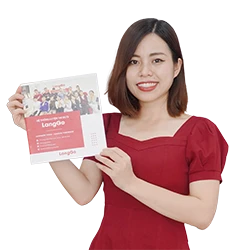

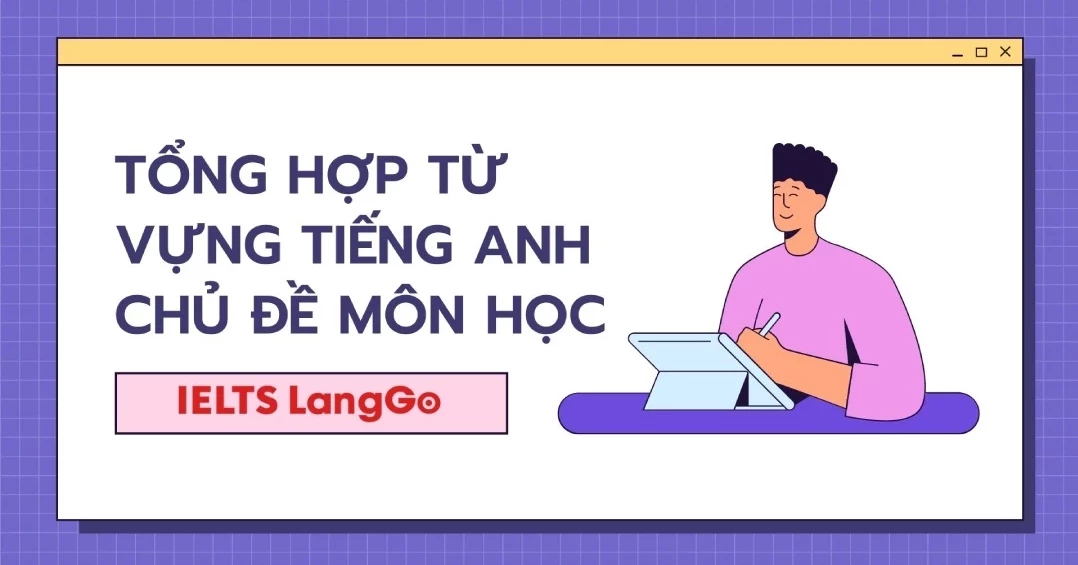
Các môn học bằng tiếng Anh là chủ điểm cơ bản đã được làm quen ngay từ những ngày đầu trở thành học sinh.
Tuy vậy, các bạn thường chỉ biết tới tên gọi những môn học quen thuộc như Mathematics (Maths), Literature, English,… đúng không? Vậy những môn học khác có tên gọi và cách đọc là gì?
Cùng IELTS LangGo tìm hiểu trong bài viết dưới đây nhé.
Môn học tiếng Anh là academic discipline hay subject/ subject of study. Dưới đây, IELTS LangGo tổng hợp các môn học theo từng tổ hợp giúp bạn dễ theo dõi và ghi nhớ. Cùng học từ vựng tiếng Anh về môn học nhé.
| Nghĩa tiếng Việt | Môn học tiếng Anh | Phiên âm |
| Hoá học | Chemistry | /ˈkem.ə.stri/ |
| Sinh học | Biology | /baɪˈɑː.lə.dʒi/ |
| Tin học | Information technology | /ɪn.fəˌmeɪ.ʃən tekˈnɒl.ə.dʒi/ |
| Toán học | Math | /mæθ/ |
| Đại số | Algebra | /ˈæl.dʒə.brə/ |
| Hình học | Geometry | /dʒiˈɑː.mə.tri/ |
| Vật lý | Physics | /ˈfɪz.ɪks/ |
| Khoa học | Science | /ˈsaɪ.əns/ |
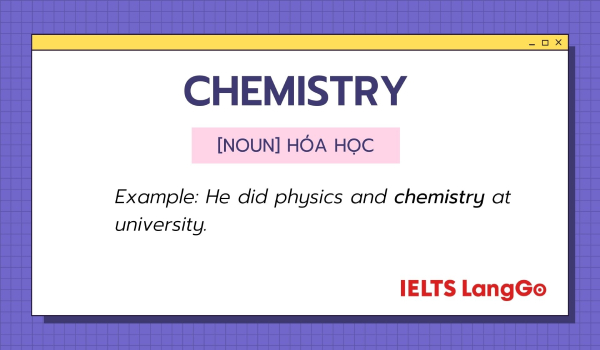
Các môn học bằng tiếng Anh tổ hợp khoa học tự nhiên
Khác với những môn khoa học tự nhiên chủ yếu liên quan đến tính toán, những môn khoa học xã hội tập trung nghiên cứu các vấn đề xã hội với con người là đối tượng chính. Cùng gọi tên những môn học này trong tiếng Anh nhé!
| Nghĩa tiếng Việt | Môn học tiếng Anh | Phiên âm |
| Ngữ văn | Literature | /ˈlɪt̬.ɚ.ə.tʃɚ/ |
| Chính trị học | Politics | /ˈpɑː.lə.tɪks/ |
| Tâm lý học | Psychology | /saɪˈkɑː.lə.dʒi/ |
| Nghiên cứu xã hội | Social studies | /ˈsoʊ.ʃəl ˌstʌd.iz/ |
| Địa lý | Geography | /dʒiˈɑː.ɡrə.fi/ |
| Lịch sử | History | /ˈhɪs.t̬ɚ.i/ |
| Giáo dục công dân | Civic Education | /ˈsɪv.ɪk ˌedʒ.əˈkeɪ.ʃən/ |
| Đạo đức | Ethics | /ˈeθ·ɪks/ |
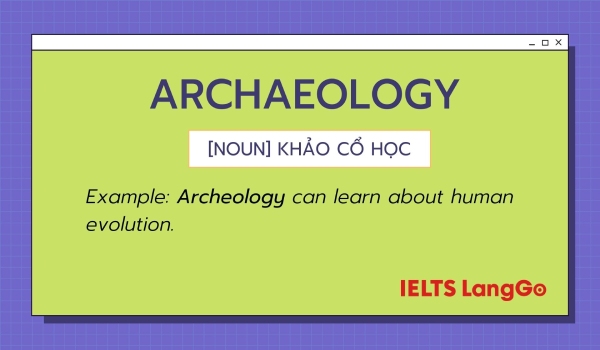
Các môn học bằng tiếng Anh tổ hợp khoa học xã hội
| Nghĩa tiếng Việt | Môn học tiếng Anh | Phiên âm |
| Thể dục | Physical education | /ˌfɪz.ɪ.kəl ed.jʊˈkeɪ.ʃən/ |
| Thể dục nhịp điệu | Aerobics | /erˈoʊ.bɪks/ |
| Điền kinh | Athletics | /æθˈlet̬.ɪks/ |
| Thể dục dụng cụ | Gymnastics | /dʒɪmˈnæs.tɪks/ |
| Quần vợt | Tennis | /ˈten.ɪs/ |
| Chạy bộ | Running | /ˈrʌn.ɪŋ/ |
| Bơi lội | Swimming | /ˈswɪm.ɪŋ/ |
| Bóng đá | Football | /ˈfʊt.bɑːl / soccer /ˈsɑː.kɚ/ |
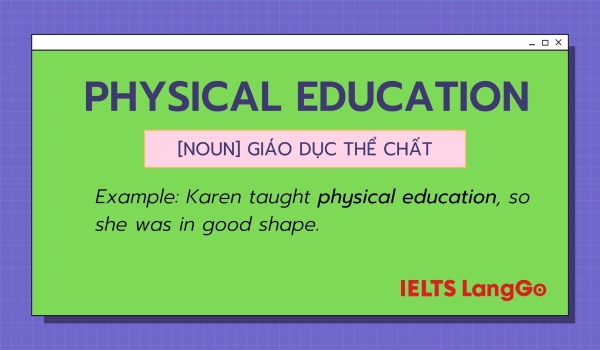
Từ vựng tiếng Anh về môn học thể dục thể thao
Những bạn yêu thích vẽ vời và hay ca hát thì không thể không biết đến bộ từ vựng tiếng Anh về môn nghệ thuật sau đây:
| Nghĩa tiếng Việt | Môn học tiếng Anh | Phiên âm |
| Mỹ thuật | Fine art | /ˌfaɪn ˈɑːrt/ |
| Âm nhạc | Music | /ˈmjuː.zɪk/ |
| Kịch | Drama | /ˈdræm.ə/ |
| Văn hóa cổ điển | Classics | /ˈklæs·ɪks/ |
| Khiêu vũ | Dance | /dæns/ |
| Hội họa | Painting | /ˈpeɪn.t̬ɪŋ/ |
| Điêu khắc | Sculpture | /ˈskʌlp.tʃɚ/ |
| Mỹ thuật | Fine art | /ˌfaɪn ˈɑːrt/ |
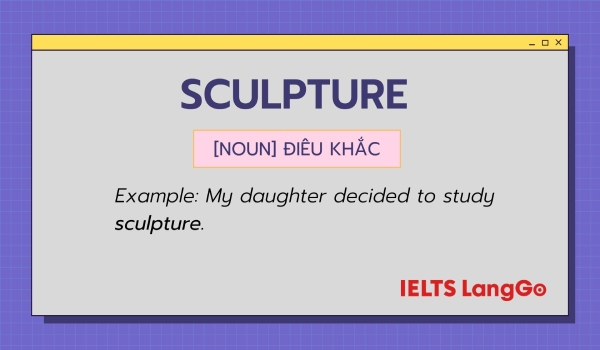
Từ vựng các môn học tiếng Anh về Văn hoá - nghệ thuật
Những bạn đang học Đại học chắc hẳn đã quen thuộc với những bộ môn gây “sóng gió” cho bao thế hệ sinh viên như Toán cao cấp, Triết học Mác-Lênin, .... Vậy liệu bạn có biết trong tiếng Anh những môn này được gọi là gì không?Tên môn học đại học phổ biến bằng tiếng Anh
| Nghĩa tiếng Việt | Môn học tiếng Anh | Phiên âm |
| Kinh tế vĩ mô. | Macroeconomics | /ˌmæk.roʊ.e.kəˈnɑː.mɪks/ |
| Kinh tế vi mô. | Microeconomics | /ˌmaɪ.kroʊ.iː.kəˈnɑː.mɪks/ |
| Kinh tế phát triển. | Development economics | /dɪˈvel.əp.mənt ˌiː.kəˈnɑː.mɪks/ |
| Toán cao cấp. | Calculus | /ˈkæl.kjə.ləs/ |
| Kinh tế lượng. | Econometrics | /iˌkɑː.nəˈmet.rɪks/ |
| Kinh tế công cộng. | Public Economics | /ˈpʌb.lɪk ˌiː.kəˈnɑː.mɪks/ |
| Toán xác suất. | Probability | /ˌprɑː.bəˈbɪl.ə.t̬i/ |
| Pháp luật đại cương. | Introduction to laws | /ˌɪntrəˈdʌkʃn tə lɔːs/ |
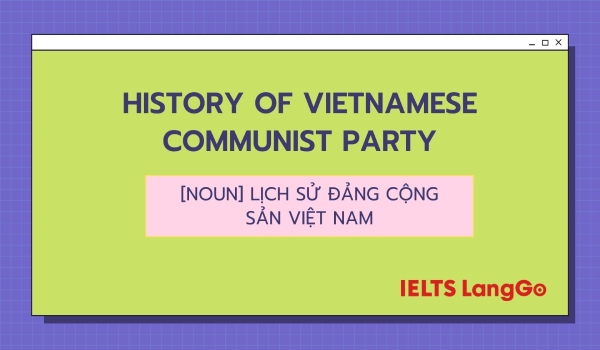
Việc bổ sung các từ vựng tiếng Anh chủ đề môn học sẽ giúp bạn mở rộng và củng cố thêm vốn từ của mình. Tuy nhiên, nếu chỉ học các từ đơn lẻ thì bạn sẽ không biết cách áp dụng những từ ấy vào trong câu như thế nào.
Dưới đây, IELTS LangGo sẽ mang đến cho bạn những cấu trúc nói về môn học thường gặp mà bạn nên biết.
| S + has/ have/study + tên môn học + (today/in your school) |
Đây là cấu trúc dùng để trả lời cho câu hỏi “What subjects did you study today/yesterday/last week..?”.
Ví dụ:
A: What subjects did you study yesterday? (Ngày hôm qua bạn đã học những môn nào?)
B: Yesterday I had/studied Literature, English and Geometry. (Hôm qua tôi học Văn, Tiếng Anh và Hình học.)
| Trợ động từ + S + have/study + tên môn học + (yesterday/today/tomorrow)? |
Đây là câu Yes/No question dùng để hỏi ai đó rằng họ có học môn … vào thời gian… hay không. Thời gian ở đây có thể là ngày hôm qua, ngày mai, tuần trước, hôm nay, các thứ trong tuần…
Ví dụ:
A: Does Mary have Math today? (Mary có học môn Toán hôm nay không?)
B: Yes, she does. (Có, cô ấy có học.) / No, she doesn’t. (Không, cô ấy không học.)
| When + trợ động từ + S + has/have/study + tên môn học? |
Đây là câu hỏi dùng để hỏi khi nào thì người nào đó học môn …
Ví dụ:
A: When do you study Biology? (Khi nào bạn học môn Sinh học?)
B: I study it on every Friday. (Tôi học Sinh học vào mỗi thứ 6 hàng tuần.)
English:
Mathematics:
Biology:
Chemistry:
Physics:
History:
Computer Science:
Economics:
Psychology:
Political Science:
Q1: Let's talk about your studies. Can you tell me what you are currently studying or what subject you studied in your last course?
Answer:
Certainly. I am currently pursuing a degree in Computer Science. It's a field that has always fascinated me, and I find the study of computer systems, programming, and algorithms to be both challenging and rewarding. In my last course, I focused on a range of subjects such as database management, software engineering, and artificial intelligence.
Q2: That sounds interesting. Why did you choose to study Computer Science?
Answer:
Well, I've always been intrigued by the rapid advancements in technology, and I believe that Computer Science is at the forefront of these innovations. The ability to create software solutions that can solve real-world problems is something that excites me. Besides, the demand for skilled professionals in the field is high, and I wanted to be part of an industry that is dynamic and continually evolving.
Q3: Can you describe a particularly challenging aspect of your studies?
Answer:
Certainly. One of the challenging aspects is mastering complex programming languages. Understanding the syntax and logic behind different languages requires a lot of practice and problem-solving skills. Additionally, staying updated with the latest technologies and industry trends poses its own set of challenges. However, overcoming these challenges is part of the learning process, and it's immensely satisfying when you see the results of your efforts in a working program or project.
Certainly! In IELTS Speaking Part 1, the examiner may ask questions related to your studies. Here's a sample response:
Q4: Let's talk about your studies. Can you tell me what you are currently studying or what subject you studied in your last course?
Answer:
Certainly. I am currently pursuing a degree in Computer Science. It's a field that has always fascinated me, and I find the study of computer systems, programming, and algorithms to be both challenging and rewarding. In my last course, I focused on a range of subjects such as database management, software engineering, and artificial intelligence.
Q5: That sounds interesting. Why did you choose to study Computer Science?
Answer:
Well, I've always been intrigued by the rapid advancements in technology, and I believe that Computer Science is at the forefront of these innovations. The ability to create software solutions that can solve real-world problems is something that excites me. Besides, the demand for skilled professionals in the field is high, and I wanted to be part of an industry that is dynamic and continually evolving.
Q6: Can you describe a particularly challenging aspect of your studies?
Answer:
Certainly. One of the challenging aspects is mastering complex programming languages. Understanding the syntax and logic behind different languages requires a lot of practice and problem-solving skills. Additionally, staying updated with the latest technologies and industry trends poses its own set of challenges. However, overcoming these challenges is part of the learning process, and it's immensely satisfying when you see the results of your efforts in a working program or project.
Q7: How do you usually organize your study time?
Answer:
I try to maintain a structured study routine. I allocate specific time slots for different subjects and tasks. For instance, I dedicate focused blocks of time for coding practice, reading academic materials, and working on projects. This helps me stay organized and ensures that I cover all aspects of my coursework effectively. I also believe in taking short breaks to refresh my mind and maintain productivity.
Q8: Thank you. Can you see yourself working in a related field in the future?
Answer:
Absolutely. I see myself pursuing a career in software development or perhaps exploring opportunities in artificial intelligence. The field of Computer Science offers a wide range of possibilities, and I'm excited about the prospect of contributing to innovative projects that can make a positive impact on society.
Vocabulary:
Coursework: đồ án/ giáo trình
Pursue: theo đuổi
Career: nghề nghiệp
Software development: phát triển phần mềm
Artificial intelligence (AI): trí tuệ nhân tạo
Innovative: cải tiến
Impact on: ảnh hưởng/ tác động đến…
Curriculum: chương trình học
Put theory into practice: áp dụng lý thuyết vào thực hành
Essential skill: kỹ năng cơ bản
Bookworm: người mọt sách
Describe a subject you enjoyed studying at school. You should say:
Sample Response:
I'd like to talk about a subject that I thoroughly enjoyed during my time in school, and that is Physics. I studied Physics during my high school years, and it was one of the most fascinating subjects I encountered.
I began my exploration of Physics in the 10th grade, and it continued to be a part of my curriculum until the 12th grade. What fascinated me most about Physics was its ability to explain the fundamental principles that govern the natural world. The laws of motion, the concept of energy, and the mysteries of the universe captured my imagination and fueled my curiosity.
One of the reasons I enjoyed Physics was the hands-on experiments we conducted in the laboratory. These experiments helped to bridge the gap between theory and practical application, making the subject more engaging and tangible. I vividly remember experimenting with simple machines, exploring the properties of light, and delving into the mysteries of electricity.
Moreover, Physics provided a logical framework for understanding the world around us. It taught me to think critically, solve problems methodically, and approach complex phenomena with a systematic mindset. I found satisfaction in solving challenging physics problems, and this problem-solving aspect of the subject greatly appealed to me.
Additionally, my Physics teacher played a crucial role in making the subject enjoyable. He had a knack for making complex concepts accessible, and his passion for the subject was contagious. His enthusiasm encouraged me to explore beyond the curriculum and delve into the more intricate aspects of Physics.
In conclusion, studying Physics was not just an academic pursuit for me; it was a journey of discovery and intellectual growth. The subject's ability to explain the fundamental principles of the natural world, coupled with engaging experiments and an inspiring teacher, made it a memorable and enjoyable part of my academic experience.
Như vậy trong bài viết này IELTS LangGo đã chia sẻ với bạn những từ vựng tiếng Anh chủ đề môn học phổ biến nhất. Hy vọng bài học hôm nay sẽ giúp bạn mở rộng và bồi đắp vốn từ vựng tiếng Anh của mình.
Các bạn có thể học thêm từ vựng về các chủ đề khác mà IELTS LangGo đã tổng hợp tại website IELTS LangGo nhé.



ĐẶT LỊCH TƯ VẤN MIỄN PHÍ LỘ TRÌNH Săn ƯU ĐÃI lên tới 12.000.000đ